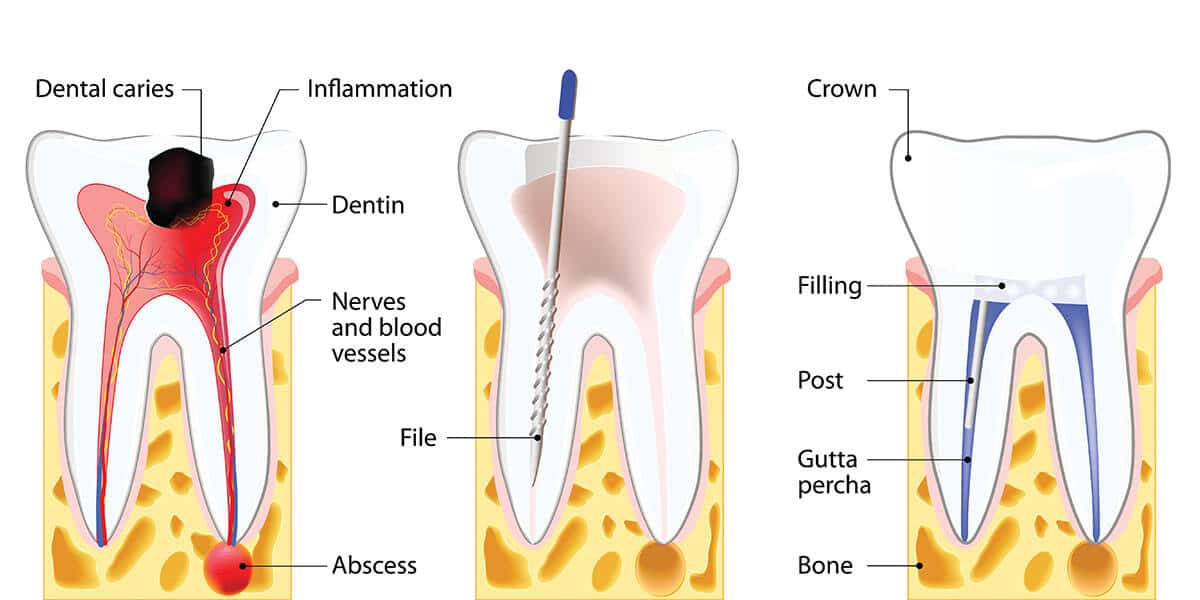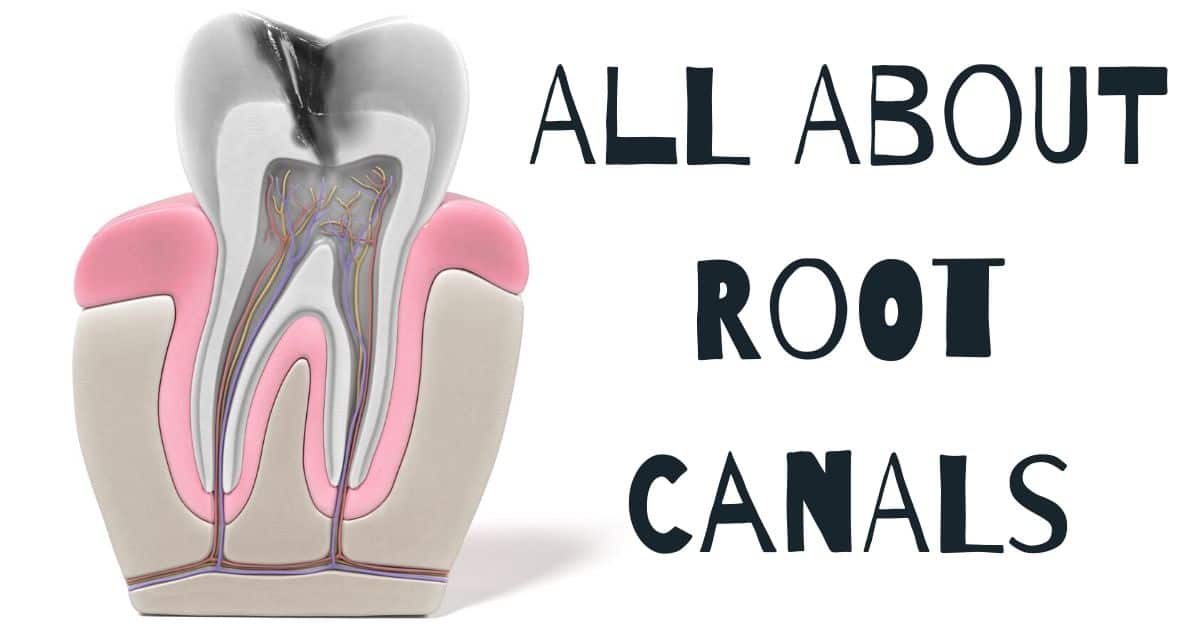It’s clear that people fear root canals. If you did a survey if people would rather have a one-hour root canal procedure or stay in prison for one week, you can imagine how the responses could be split. But why. Do root canals hurt?
The answer may surprise you.
And lucky for you, if you’ve been recommended a root canal and crown, it may not be as bad as your mind is leading you to believe. When it comes to root canals, our minds tend to wander to the worst. But does a root canal and crown require you to break a sweat in anxious panic?
Probably not.
In this article, we’ll talk about what you can expect for a root canal and crown, why people have a fear of root canals, and we’ll answer the question…does a root canal hurt?
Why Do I Need a Root Canal and Crown?
Dental work can be confusing. It’s frustrating when we are recommended something that we don’t understand why it’s needed. Let’s clear that up.
A root canal is needed when there is damage deep to the tooth.
The damage can be caused by several different sources.
Tooth damage that leads to a root canal may be caused by slow, progressive damage like that of tooth decay. Tooth decay starts small on the external surface of the tooth. If untreated long enough it eventually progressive deeper into the tooth.
Tooth damage may also be caused by a sudden trauma to the tooth like a blow to the face, slip, fall, or fracture of a tooth. Severe trauma to a tooth can cause enough force to damage deep within the tooth.
The key to understand is that the outer enamel is like a helmet for a tooth. It protects the more vital structures such as the nerve and blood supply. These vital structures are located in the root canals of the teeth.
Therefore, shallow damage of a tooth can be replaced with a filling, but when a tooth has deep damage it requires a root canal to correct it.
The root canal cleans out and fills the roots of the teeth. By completing a root canal it removes infection or inflammation of the nerve. Hence, it takes any painful damage away.
Okay, I understand that. But why does a tooth need a crown after the root canal?
A root canal is a compromise.
The procedure corrects damage to the inner nerve of a tooth, but at the same time, it removes the blood supply to the tooth. This dehydrates the tooth and makes it more susceptible to fracture.
A crown protects the tooth similar to how enamel does. It holds everything together which reduces the chance of fracture after a root canal. That’s why your dentist is recommending not only a root canal, but instead a root canal and crown. The crown is important to the success of the procedure. It keeps the tooth stable from dangerous fractures.
What is a Root Canal and Crown Like?

Let’s talk about the procedure. That’s the big question mark that’s probably creating fear.
Do root canals hurt? We’ll get to that in the next section, but first, here’s how I want you to think of root canals. Have you ever had a dental filling?
A root canal is like a dental filling, except it’s a filling of the root of the tooth.
The process is quite similar. The dentist or endodontist will numb the area with a local anesthetic. Once you are numb you shouldn’t feel any pain from the procedure.
Just like a good chef wears an apron. The dentist covers the tooth with an apron called a rubber dam. The rubber dam protects the tooth and keeps it sterile. A small hole is made in the top of the tooth and the dentist cleans out the roots of the teeth. The dentist uses instruments called files which are basically miniature pipe cleaners. The files clean the roots of the tooth along with a disinfecting solution.
In some cases when a tooth is very infected, it might be best to treat the tooth first with antibiotics prior to a root canal.
The reason is because local anesthetics don’t work great in parts of the body that have swelling. The antibiotic reduces swelling and inflammation of the area. And bingo, a root canal can be pain-free in all scenarios. It might just take a few days on the antibiotic.
Back to the procedure. After cleaning the roots of the tooth, the dentist completes the root canal procedure by filling the roots with a soft filling material and a temporary filling is placed. That’s it.
The root canal procedure takes about 60 to 90 minutes. Occasionally a second follow-up visit may be required.
After the root canal is completed, the tooth is ready to receive a crown. The dentist again numbs to the tooth, removes the temporary material, and replaces it with a permanent material. The tooth is then reshaped so that the crown can replace the enamel of the tooth without increasing its bulk. An impression of the tooth is taken, and a crown is a custom made to be cemented over the tooth.
A root canal and crown requires a few steps, however, the upside is huge. Studies show that the success rate of an initial root canal procedure is 94%. The process has the ability to completely and predictably save a very damaged tooth.
Do Root Canals Hurt

Ah yes, the question on everyone’s mind. Does a root canal hurt?
Nope. It’s a misconception.
Here’s why we have that false conception. When you need a root canal it’s usually because your tooth hurts.
The reality is a root canal procedure does not hurt. It’s that your tooth hurts and…that’s why you need the procedure. Get it?
When you are recommended a root canal and crown by your dentist it’s because there’s damage to your tooth. Often that damage is causing some sort of pain. The damage, such as the infection, decay, or tooth fracture is the reason you’re in pain.
The root canal procedure is the method to remove the pain.
Okay, I get that…but does a root canal hurt during the procedure at all?
During a root canal procedure, the dentist numbs the area effectively. You will know the dentist is working. You may feel movement or minor pressure, but you shouldn’t feel pain. If you do the dentist or endodontist will offer you more local anesthetic.
Oh, and that’s not all. Although many people complete root canal procedures with only local anesthetic, you also have the option of completing a root canal with sedation dentistry. A root canal with sedation dentistry allows the patient to be more relaxed during the procedure or even sleep during a root canal. So that’s also an additional option.
After a root canal, there may be some tenderness in the area, but generally, you will feel much better than you did before. The area heals over the next few days and allows you to live pain-free again.
Does a Root Canal Hurt: The Bottom Line?
Although it’s natural to be anxious about any medical or dental procedure, it’s important to understand proper expectations.
When it comes to root canals, the bottom line is that the procedure should not be uncomfortable.
The misconception that root canals hurt is because root canals are often recommended to treat tooth pain, some of the most severe pain to be exact. However, when answering the question does a root canal hurt during the actual procedure, the answer is no.
You can rest assured that modern anesthetics and technology can keep you fully comfortable during the root canal procedure. And studies show that root canal procedures are a long term solution with most root-canaled teeth lasting longer than 20 years after the procedure.


